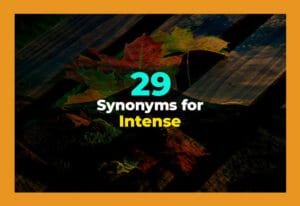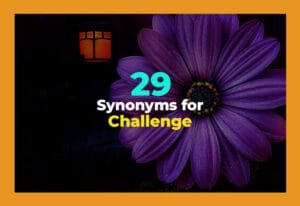Being intuitive means understanding things quickly and naturally without needing much explanation. Words like instinctive, perceptive, and insightful can express similar ideas. These synonyms are helpful when describing people, thoughts, or decisions that feel natural or smart. In this article, we will explore 31 great synonyms for intuitive and show how to use them with examples.
31 Different Ways to Say INTUITIVE: Another Word for Intuitive
Instinctive
Instinctive is a synonym for intuitive because it describes reactions or decisions that come naturally without thinking too hard. When someone acts instinctively, they rely on their gut feeling or natural sense rather than detailed analysis. It works well for describing behaviors, choices, or responses that feel automatic. People often use instinctive to show quick thinking or natural understanding in everyday life. Instinctive can describe both actions and thoughts that happen effortlessly. It connects to intuitive because both involve understanding or reacting naturally.
- She had an instinctive sense that something was wrong.
- His instinctive reaction saved the child from danger.
- Artists often rely on instinctive creativity to make their work shine.
Natural
Natural is a simple and easy synonym for intuitive. It describes abilities or behaviors that seem effortless or built-in. When someone is naturally talented or skilled, they show understanding without needing guidance. Natural works well when talking about talents, thinking, or emotional awareness. It gives a positive impression and suggests that the ability is part of a person's core self. Using natural can make your description feel warm and relatable. Like intuitive, it shows ease and smooth understanding in everyday situations.
- She has a natural talent for reading people's emotions.
- His natural way of solving problems amazes everyone.
- Some people are natural leaders without trying.
Innate
Innate describes qualities or abilities that exist from birth. It is closely related to intuitive because it shows something is inherent, not learned. Use innate to talk about natural understanding or quick perception that someone possesses. It works well in both formal and casual contexts. Innate suggests a deep, built-in sense that guides thoughts or actions. It is often used to praise natural skills or intelligence. This synonym connects directly to intuitive because both imply effortless awareness or insight.
- She has an innate understanding of human behavior.
- His innate sense of timing makes him a great musician.
- People with an innate curiosity learn things faster.
Spontaneous
Spontaneous can be used for intuitive because it describes actions done naturally without planning. It shows someone reacting in the moment based on feeling or understanding. Spontaneous works for people who make quick, natural decisions. It gives a lively, fresh impression and emphasizes freedom and instinct. Using spontaneous conveys ease and a natural flow in thought or action. It relates to intuitive because both suggest reacting correctly without overthinking.
- His spontaneous reply surprised everyone in the meeting.
- She has a spontaneous way of solving problems.
- They enjoyed a spontaneous road trip last weekend.
Automatic
Automatic refers to responses or actions that happen without conscious thought. It is a close match for intuitive when describing reactions that are quick and natural. Automatic works well for habits, skills, or thinking that comes easily. It gives the impression that the person doesn't need effort to understand or act. Using automatic highlights reliability and natural flow in behavior. Like intuitive, it implies smooth and immediate understanding.
- His automatic reaction was to help her up.
- She typed the report with automatic precision.
- Athletes often have automatic responses during games.
Unconscious
Unconscious is used to describe understanding or reactions happening without deliberate thought. It connects to intuitive because it shows awareness that doesn't require effort. This synonym works when highlighting natural insight or perception. Unconscious actions can reveal deep instincts or natural talent. It can describe emotional, mental, or physical reactions. Using unconscious emphasizes the effortless nature of intuitive understanding.
- He had an unconscious ability to comfort people.
- Her unconscious choices always led to the right outcomes.
- The actor's unconscious gestures made the scene more real.
Immediate
Immediate describes understanding or action that happens right away. It relates to intuitive because it shows a quick grasp or natural perception. Immediate works for decisions, reactions, and realizations. It gives a sense of speed and natural clarity. Using immediate emphasizes how quickly someone comprehends situations. Like intuitive, it suggests minimal thinking is needed to understand or act.
- She gave an immediate answer without hesitation.
- His immediate reaction saved the meeting from chaos.
- Immediate understanding often comes with experience.
Perceptive
Perceptive is a strong synonym for intuitive because it highlights being observant and quick to notice details. People who are perceptive can understand situations or emotions naturally. It is used to describe sharp awareness or insightful thinking. Perceptive works well in personal and professional contexts. Using perceptive shows intelligence and sensitivity to subtle cues. Like intuitive, it describes understanding without needing explicit explanations.
- She is very perceptive and notices small changes in mood.
- His perceptive comments impressed the teacher.
- Being perceptive helps in negotiations.
Insightful
Insightful emphasizes deep understanding and awareness. It relates to intuitive because it shows someone can see the truth without much effort. Insightful is often used for thoughts, advice, or observations. It works in professional, personal, or creative contexts. Using insightful highlights wisdom and smart perception. Like intuitive, it describes someone who quickly understands situations or people.
- Her insightful feedback helped me improve my work.
- He gave an insightful analysis of the problem.
- Insightful observations often lead to better decisions.
Sharp
Sharp describes someone quick to notice and understand things. It relates to intuitive because it suggests mental alertness and clear perception. Sharp works for thinking, reacting, or analyzing situations. Using sharp conveys intelligence and quick understanding. It can describe both people and their ideas. Like intuitive, it shows someone grasps situations easily without needing long explanations.
- She is sharp and always understands instructions immediately.
- His sharp mind solved the puzzle quickly.
- Being sharp helps in both school and work.
Quick-witted
Quick-witted emphasizes fast thinking and clever responses. It is a good match for intuitive because it shows someone reacts naturally and smartly. Quick-witted works for conversations, problem-solving, and humor. Using quick-witted makes the person sound lively and intelligent. Like intuitive, it highlights fast understanding and natural ability to respond correctly.
- He is quick-witted and always makes clever jokes.
- Her quick-witted response impressed the interviewer.
- Quick-witted people often handle problems efficiently.
Clever
Clever describes someone smart and inventive. It connects to intuitive because clever people understand things naturally and find easy solutions. Clever works well in both casual and professional contexts. Using clever shows creativity and smart thinking. Like intuitive, it emphasizes natural understanding without much effort.
- She is clever and solves problems easily.
- His clever idea saved the project.
- Being clever often helps in tricky situations.
Smart
Smart is a simple and common synonym for intuitive. It highlights intelligence and quick understanding. Smart works in almost any context. Using smart shows natural ability and easy comprehension. Like intuitive, it describes people who get things quickly without needing much explanation.
- She is smart and always understands quickly.
- His smart approach solved the issue.
- Smart students learn faster.
Sagacious
Sagacious means wise and good at making decisions. It relates to intuitive because sagacious people often rely on natural understanding. Sagacious is more formal than some synonyms but works well for advice or judgments. Using sagacious conveys experience and deep insight. Like intuitive, it describes people who act correctly without overthinking.
- The sagacious leader guided the team through challenges.
- Her sagacious advice helped me make the right choice.
- Sagacious decisions often come from natural understanding.
Wise
Wise emphasizes experience and sound judgment. It is linked to intuitive because wise people often act naturally and correctly. Wise works for advice, actions, and understanding. Using wise conveys respect and intelligence. Like intuitive, it shows someone grasps situations quickly and makes good choices.
- She is wise and always knows what to do.
- His wise words calmed the crowd.
- Wise people learn from experience.
Astute
Astute highlights sharpness and cleverness in understanding situations. It relates to intuitive because astute people notice things quickly and act wisely. Astute works well for business, negotiations, or strategy. Using astute shows skill and alertness. Like intuitive, it describes natural perception and quick thinking.
- She is astute in recognizing opportunities.
- His astute analysis impressed the manager.
- Being astute helps in solving problems fast.
Sensitive
Sensitive describes awareness of emotions or surroundings. It relates to intuitive because sensitive people naturally understand feelings and situations. Sensitive works well for emotional intelligence and care. Using sensitive conveys empathy and attentiveness. Like intuitive, it shows natural perception without needing explanations.
- She is sensitive to her friends' needs.
- His sensitive approach helped calm the situation.
- Sensitive people notice small details easily.
Discerning
Discerning highlights the ability to notice and understand subtle differences. It relates to intuitive because discerning people make judgments naturally. Discerning works for taste, opinions, or evaluations. Using discerning conveys wisdom and careful observation. Like intuitive, it describes quick and accurate understanding.
- She has a discerning eye for art.
- His discerning taste impressed the guests.
- Being discerning helps make better choices.
Observant
Observant emphasizes noticing details quickly. It relates to intuitive because observant people pick up on information naturally. Observant works for people, surroundings, and situations. Using observant conveys alertness and awareness. Like intuitive, it shows natural understanding without effort.
- He is very observant and never misses details.
- Observant students learn faster.
- She stayed observant during the meeting.
Thoughtful
Thoughtful describes someone who considers things carefully and naturally understands others. It relates to intuitive because thoughtful people notice what matters. Thoughtful works for behavior, advice, and decisions. Using thoughtful conveys care and consideration. Like intuitive, it shows awareness and understanding.
- She gave a thoughtful response to the question.
- His thoughtful actions helped everyone.
- Being thoughtful shows natural understanding.
Quick
Quick highlights speed in thinking or acting. It relates to intuitive because quick people understand situations fast. Quick works for reactions, comprehension, and problem-solving. Using quick shows efficiency and natural ability. Like intuitive, it describes immediate understanding without overthinking.
- She is quick and always gets things right.
- His quick thinking solved the issue.
- Quick learners adapt easily.
Prudent
Prudent emphasizes careful and wise decision-making. It relates to intuitive because prudent people naturally understand risks and benefits. Prudent works for advice, actions, and planning. Using prudent conveys thoughtfulness and foresight. Like intuitive, it shows natural insight into situations.
- She made a prudent choice for her future.
- His prudent decisions saved money.
- Being prudent prevents mistakes.
Rational
Rational describes logical and clear thinking. It relates to intuitive because rational people combine understanding with insight naturally. Rational works in thinking, decisions, and analysis. Using rational conveys intelligence and careful reasoning. Like intuitive, it shows natural comprehension.
- She gave a rational explanation for her choice.
- His rational thinking solved the problem.
- Rational people stay calm under pressure.
Perceptual
Perceptual emphasizes understanding through awareness and observation. It relates to intuitive because perceptual people notice details easily. Perceptual works in learning, awareness, and interpretation. Using perceptual conveys natural understanding. Like intuitive, it shows quick grasp of situations.
- She has strong perceptual skills in art.
- His perceptual abilities help in problem-solving.
- Being perceptual helps notice small changes.
Informed
Informed describes someone with knowledge and understanding. It relates to intuitive because informed people often grasp situations naturally. Informed works for opinions, decisions, and advice. Using informed conveys intelligence and awareness. Like intuitive, it shows natural understanding from knowledge.
- She made an informed decision about her career.
- His informed opinion impressed the team.
- Being informed helps avoid mistakes.
Analytical
Analytical describes careful thinking and understanding. It relates to intuitive because analytical people naturally see patterns and solutions. Analytical works for problem-solving, decisions, and studies. Using analytical conveys logical understanding. Like intuitive, it shows natural ability to grasp situations.
- Her analytical mind solved the puzzle quickly.
- He gave an analytical explanation for the results.
- Analytical people notice details others miss.
Understanding
Understanding emphasizes knowing and empathizing naturally. It relates to intuitive because understanding people grasp situations and emotions easily. Understanding works for people, situations, and advice. Using understanding conveys care and awareness. Like intuitive, it shows natural comprehension.
- She is understanding and helps everyone.
- His understanding nature makes him a good friend.
- Being understanding helps in communication.
Clear-sighted
Clear-sighted describes the ability to see things accurately and wisely. It relates to intuitive because clear-sighted people understand situations naturally. Clear-sighted works in decisions, planning, and observations. Using clear-sighted conveys intelligence and insight. Like intuitive, it shows immediate understanding.
- She is clear-sighted in making career choices.
- His clear-sighted approach solved the problem.
- Being clear-sighted avoids mistakes.
Shrewd
Shrewd emphasizes cleverness and practical understanding. It relates to intuitive because shrewd people notice details and act wisely. Shrewd works in business, decisions, and strategies. Using shrewd conveys skill and insight. Like intuitive, it shows natural perception and quick thinking.
- He is shrewd in negotiations.
- Her shrewd plan worked perfectly.
- Being shrewd helps in business decisions.
Experienced
Experienced emphasizes knowledge gained over time. It relates to intuitive because experienced people often act naturally and correctly. Experienced works for skills, decisions, and understanding. Using experienced conveys reliability and wisdom. Like intuitive, it shows natural understanding from practice.
- She is experienced and handles challenges easily.
- His experienced advice was valuable.
- Experienced people often notice details others miss.
Knowing
Knowing emphasizes awareness and understanding. It relates to intuitive because knowing people grasp situations quickly and naturally. Knowing works for behavior, insight, and judgment. Using knowing conveys confidence and perception. Like intuitive, it shows immediate comprehension.
- She gave a knowing smile.
- His knowing glance showed he understood everything.
- Being knowing helps make fast decisions.
Table of Synonyms for Intuitive
| Synonym | Example |
|---|---|
| Instinctive | She had an instinctive sense that something was wrong. |
| Natural | She has a natural talent for reading people's emotions. |
| Innate | She has an innate understanding of human behavior. |
| Spontaneous | His spontaneous reply surprised everyone in the meeting. |
| Automatic | His automatic reaction was to help her up. |
| Unconscious | He had an unconscious ability to comfort people. |
| Immediate | She gave an immediate answer without hesitation. |
| Perceptive | She is very perceptive and notices small changes in mood. |
| Insightful | Her insightful feedback helped me improve my work. |
| Sharp | She is sharp and always understands instructions immediately. |
| Quick-witted | He is quick-witted and always makes clever jokes. |
| Clever | She is clever and solves problems easily. |
| Smart | She is smart and always understands quickly. |
| Sagacious | The sagacious leader guided the team through challenges. |
| Wise | She is wise and always knows what to do. |
| Astute | She is astute in recognizing opportunities. |
| Sensitive | She is sensitive to her friends' needs. |
| Discerning | She has a discerning eye for art. |
| Observant | He is very observant and never misses details. |
| Thoughtful | She gave a thoughtful response to the question. |
| Quick | She is quick and always gets things right. |
| Prudent | She made a prudent choice for her future. |
| Rational | She gave a rational explanation for her choice. |
| Perceptual | She has strong perceptual skills in art. |
| Informed | She made an informed decision about her career. |
| Analytical | Her analytical mind solved the puzzle quickly. |
| Understanding | She is understanding and helps everyone. |
| Clear-sighted | She is clear-sighted in making career choices. |
| Shrewd | He is shrewd in negotiations. |
| Experienced | She is experienced and handles challenges easily. |
| Knowing | She gave a knowing smile. |

Final Thoughts
I hope this list of 31 synonyms for intuitive helps you express natural understanding in different ways. From instinctive to knowing, each word shows how someone can grasp situations or emotions without effort. Using these synonyms makes writing and speaking more colorful and precise. Whether describing people, ideas, or decisions, these words can help convey intelligence, awareness, and natural perception clearly. Try using them in your daily conversations and writing.









